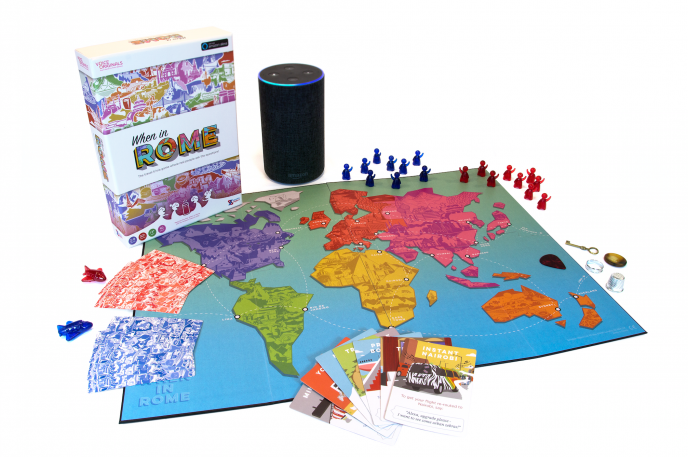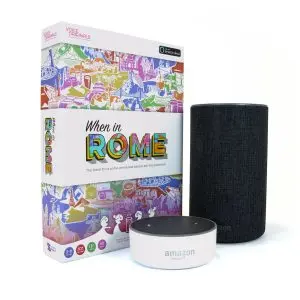Say it with me, in your best 1983 robotic voice: “Shall we play a game?”
It was inevitable: An honest-to-god physical board game with a digital assistant integration–a robot gamemaster, if you will. When it finally happened, the only question would be: Could it actually be any good?
Well, the time has come. Today, London-based Sensible Object has started taking orders in the U.S. for its new $30 game, When in Rome. It’s also launched the skill for Amazon’s Alexa voice-assistant platform that’s required to get the game up and running. That means, of course, you would do well to have an Amazon Echo—currently priced at $49.99 for the cheapest model—to play the game. It does work with Amazon’s Alexa app, however.
When in Rome, the brainchild of Sensible Object founder and CEO Alex Fleetwood, takes between two and eight players on a tour around the world, tasking them with answering various questions about global cities—their culture, history, architecture, sports, and more. Alexa runs the game, asks the questions, determines if answers are correct or not, and keeps track of the score. It sometimes even lets teams insult each other. The goal is to move your team’s piece–a plastic airplane–around the board, make friends (by answering questions correctly), and score the most points over nine rounds.
The idea has already delighted investors, Amazon among them. On Monday Fleetwood’s 25-person company announced a $3.2 million funding round that includes participation from the Amazon Alexa Fund, NCSOFT, March Capital, and London Venture Partners.
For Fleetwood, When in Rome is the end result of an idea that’s been in his head for nearly a decade, since he organized the Hide And Seek festival in London in 2007 and designed what he called the London Poetry Game.

Since then, he’s been fascinated by cities and languages, and how “extraordinary” it is to have so many spoken in one place. “You can hear and experience so many cultures on your doorstep if you live in a city,” he says, “but you don’t normally get to do that. We tend to live in our language. There’s the English language version of New York; nearby is the Spanish language version of New York.”
These thoughts left him interested in using games as a way to explore language and culture, and last year, when Sensible Object started looking for a new project in the wake of the success of its previous game, Beasts of Balance, it decided to use Alexa as a platform. The idea fit perfectly into the company’s philosophy of creating inclusive games that are augmented with technology.
The challenge, though, was not to make an Alexa-integrated game just for the sake of doing so. It had to be built around using Alexa for things that only Alexa could do, Fleetwood explains. An obvious direction was voices–local voices in cities that could be virtual tour guides, speaking in local accents, and asking questions about each place.
Fleetwood began prototyping the game working alongside Alexa experts at Amazon during a three-month stint as part of the company’s first Alexa Fund cohort in Seattle in the summer and fall of 2017. Each company in that first cohort got up to $120,000 from Amazon and Techstars. After that, Fleetwood returned to London to spend the next few months working with a broad team of game makers, interactive dialogue designers, voice talent, and writers to finish it.

AI-powered travel trivia
At its heart, When in Rome is an AI-powered travel trivia game, with Alexa as the host. The goal is to fly around the world, visiting some or all of 20 cities (London, New York, Sydney, San Francisco, Rio, Rome, Berlin, Moscow, and so on), answering questions about each place, and scoring as many points as you can. In every city you land in, you “meet” a local, and for that, Sensible Object recorded dialogue with cast members from each of the 20 cities.
Each time you land, the local host teaches you a little about the city, and then you’re asked a multiple-choice question. All of this, of course, is playing out over your Alexa device, even as players move game pieces around on a map of the world on the physical game board.
One of the great things about When in Rome is that it’s not necessary to read the printed instructions–which is good, because they’re long, and kind of confusing. Instead, Alexa leads you directly into the game, and helps you out at every turn. The gameplay is simple enough that this system works quite well. When I play-tested it recently, my friends and I picked the game up pretty quickly without reading the rules at all.

That’s not to say, of course, that there are no elements of playing an Alexa-integrated game that make you want to scream in frustration. For one, you have to start every command with “Alexa,…” much as you do when you use Alexa for its normal purposes. Over the course of a game, which lasts 30 to 40 minutes, that got tiresome. (Amazon doesn’t leave you completely without choices here: You can always change Alexa’s wake word to “computer” or, um, “Amazon.”)
As well, there’s quite a bit of narration, and it’s equally tiring listening to all of it, given that much of it is repetitive. It turns out that you can interrupt Alexa’s questions with your answers, but that’s not explained, and it took my friends and me almost an entire game before we realized that.
Plus, for a social game that can be played with up to eight people, it’s very hard to talk to your friends because you won’t be able to easily hear Alexa’s instructions. And that can mean having to sit through the narration multiple times for a single move. This is something that also needs to be improved on.
When in Rome struck us as very much a 1.0 version of the concept of an Alexa-integrated game, and no wonder. That’s exactly what it is. But almost all of us came away impressed with the idea, and with the execution. Aside from having to listen to a bit too much narration, and Alexa sometimes not always understanding our responses, the game was smooth, interesting, and most of all, fun.
The game is the first in what Sensible Object calls its Voice Originals series of voice-augmented table-top titles. I can’t wait to see where this goes next.
Recognize your brand’s excellence by applying to this year’s Brands That Matter Awards before the early-rate deadline, May 3.
